Samsung QN95D review: brains and brightness for picture perfection
Samsung’s 2024 Neo QLED flagship 4K TV quadruples its processing power to deliver superior picture and sound

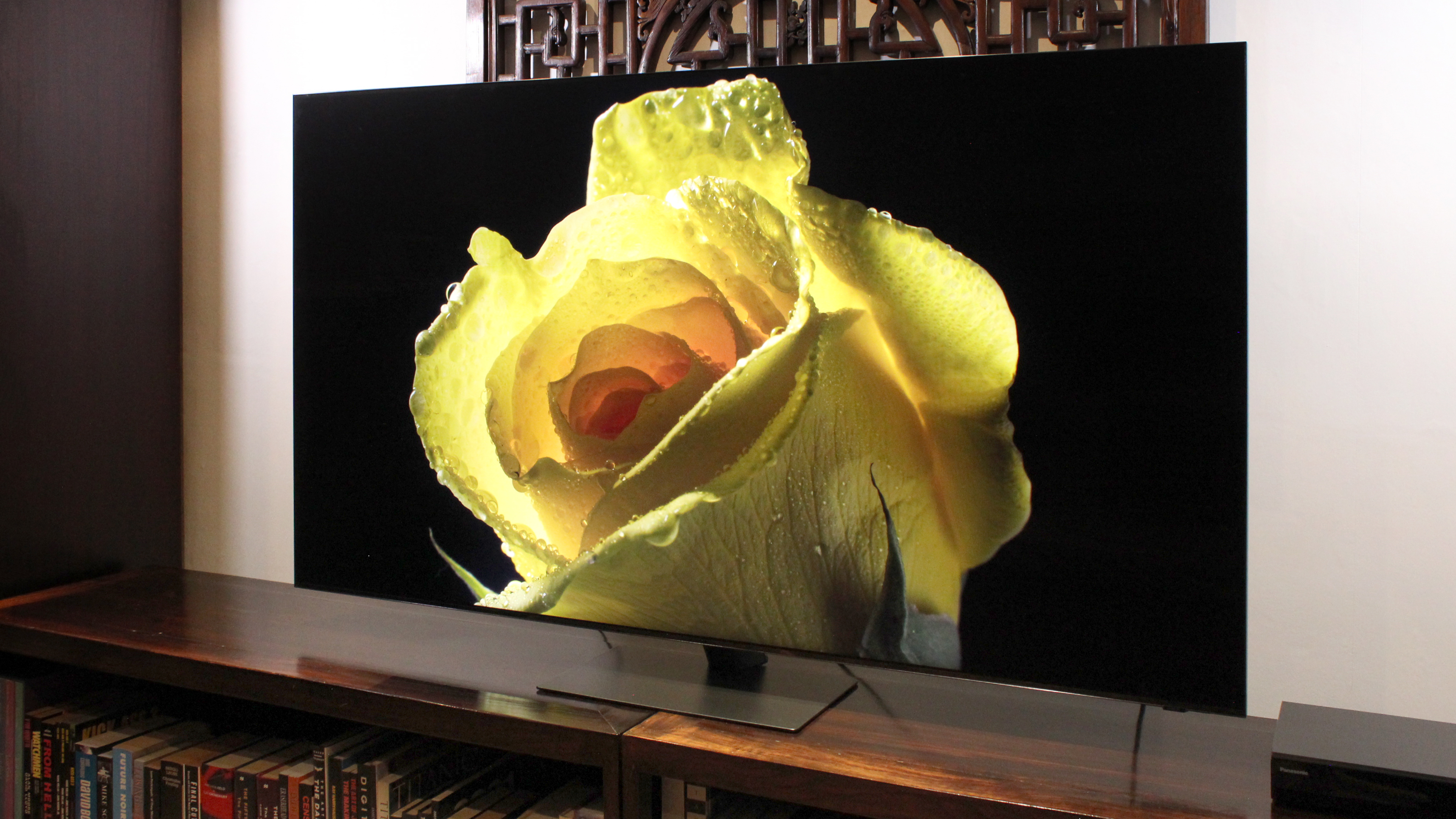

The Samsung QN95D adds state-of-the-art processing to its Mini LED backlight and class-leading local dimming to deliver a performance that looks and sounds stunning. Elegant design, great build quality, serious smarts, and extensive gaming support round out a very desirable 4K TV.
-
+
Peerless picture and sound processing
-
+
Bright and accurate HDR images
-
+
Class-leading gaming features
-
-
No Dolby Vision HDR
Why you can trust T3

Samsung’s 2024 Neo QLED TV flagship, the QN95D, may look identical to the previous QN95C model, with the same elegant design, Mini LED backlight, class-leading local dimming, immersive sound system, extensive gaming features and comprehensive smart platform. But this year the processor at its heart has undergone a serious upgrade.
The new NQ4 AI Gen2 processor with 20 neural networks produces four times the speed of the previous generation, as it brings cutting-edge deep learning algorithms to both the picture and sound. The result is a high-end 4K HDR TV that promises to deliver an even more superior performance. So is the Samsung QN95D in with a shout as being one of the best TVs in 2024?
Samsung QN95D: Price & Availability
The Samsung QN95D is now available for pre-order and comes in four screen sizes: the 55-inch, which costs £2,799; the 65-inch (as reviewed here), which retails for £3,699; the 75-inch, which is priced at £4,999; and the 85-inch that’ll set you back £6,999. Pricing in other territories is to be confirmed at the time of writing.
SAMSUNG QN95D REVIEW: FEATURES & WHAT’S NEW
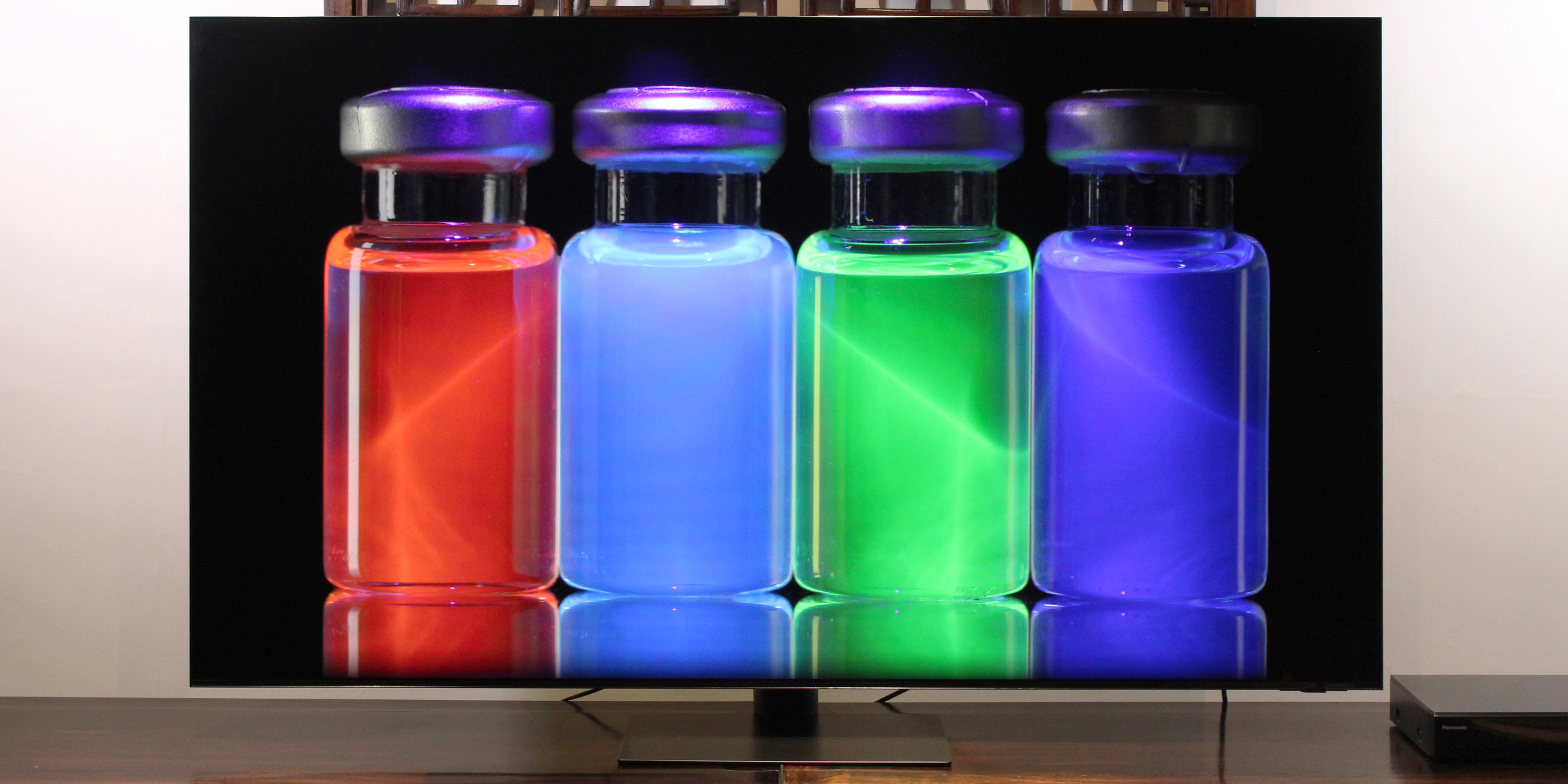
The Samsung QN95D retains many features from last year, such as a VA panel for deeper blacks, along with Quantum Tot filters for purer colours, and a Mini LED backlight with 1,344 independently dimmable zones. All these zones are combined with Samsung’s class-leading local dimming to deliver stunning images with deep blacks and clearly defined shadow detail.
The Quantum Matrix tech further enhances the backlight performance with a delivery that’s more precise and energy efficient, while Real Depth Enhancer Pro adds greater three-dimensionality by detecting the areas of focus and enhancing the depth through active control of the backlight. The resulting images enjoy more contrast and an improved sense of definition.
The Quantum Matrix tech also boosts HDR by controlling the dimmable zones to redirect power from darker parts of the picture to the brighter ones, which not only improves the dynamic range but also the energy efficiency. As for high dynamic range (HDR), the QN95D supports HDR10, hybrid log-gamma (HLG) and HDR10+ (Adaptive and Gaming), but sadly Samsung still doesn’t offer Dolby Vision.
What’s new this year is the NQ4 AI Gen2 processor with its 20 neural networks that delivers exceptional performance. The processor’s deep learning capabilities deliver flawless 4K AI upscaling, bringing out all the detail regardless of the native resolution of content. It also adds a custom picture mode that optimises the images based on genre settings and individual preferences.
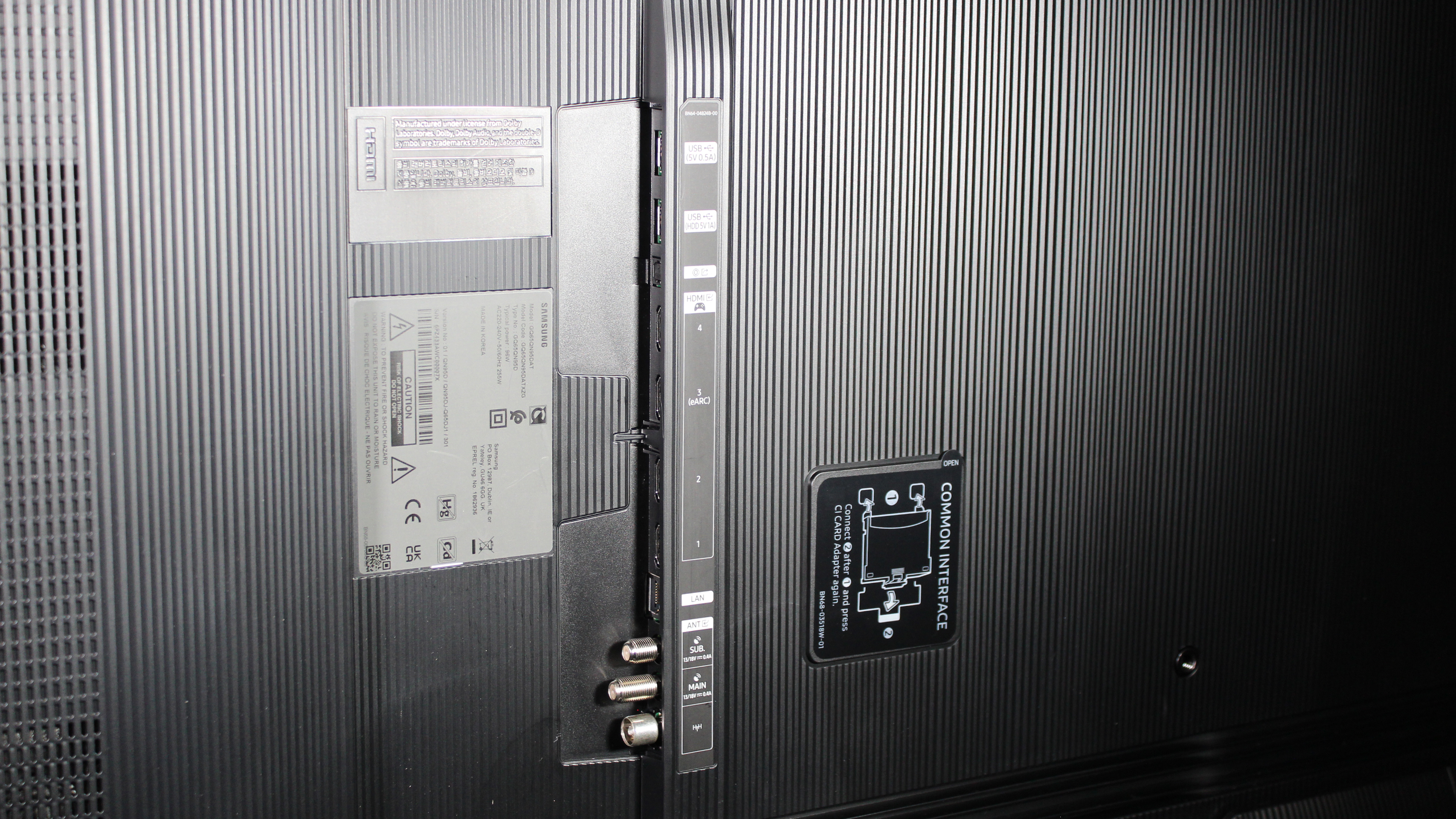
As with previous years, the QN95D includes onboard Dolby Atmos decoding, along with the ability to send Atmos back via ARC. There’s also Object Tracking Sound Plus, which uses a 4.2.2-channel speaker layout with height drivers, SpaceFit Sound for room correction, and Q Symphony for seamless integration with supporting Samsung soundbars.
Other sound features include Active Voice Amplifier Pro that, as the name suggests, uses the AI-enhanced processing to boost dialogue, ensuring every word is heard, no matter how complex the mix. The Adaptive Sound Pro also uses the advanced AI-enhanced processing to analyse and remaster the audio to ensure every aspect of the sound design is heard as the artist intended.
If you’re a gamer then the QN95D has you covered, and not just because there’s no danger of image retention or screen burn. There are four HDMI 2.1 inputs that support a host of cutting-edge enhancements such as Freesync Premium Pro and Motion Xcelerator Turbo Pro 144Hz for PC gamers, along with features like 4K/120Hz, VRR, and ALLM for next-gen console owners.
The Game Bar remains useful, allowing you to see all the main settings and technical data in one place, plus provide access to a number of gaming-related menus so you can personalise your experience. The addition of the AI Auto Game Mode is a nice feature, allowing the TV to automatically optimise the settings for your preferences and the specific type of game genre.
SAMSUNG QN95D REVIEW: PICTURE QUALITY
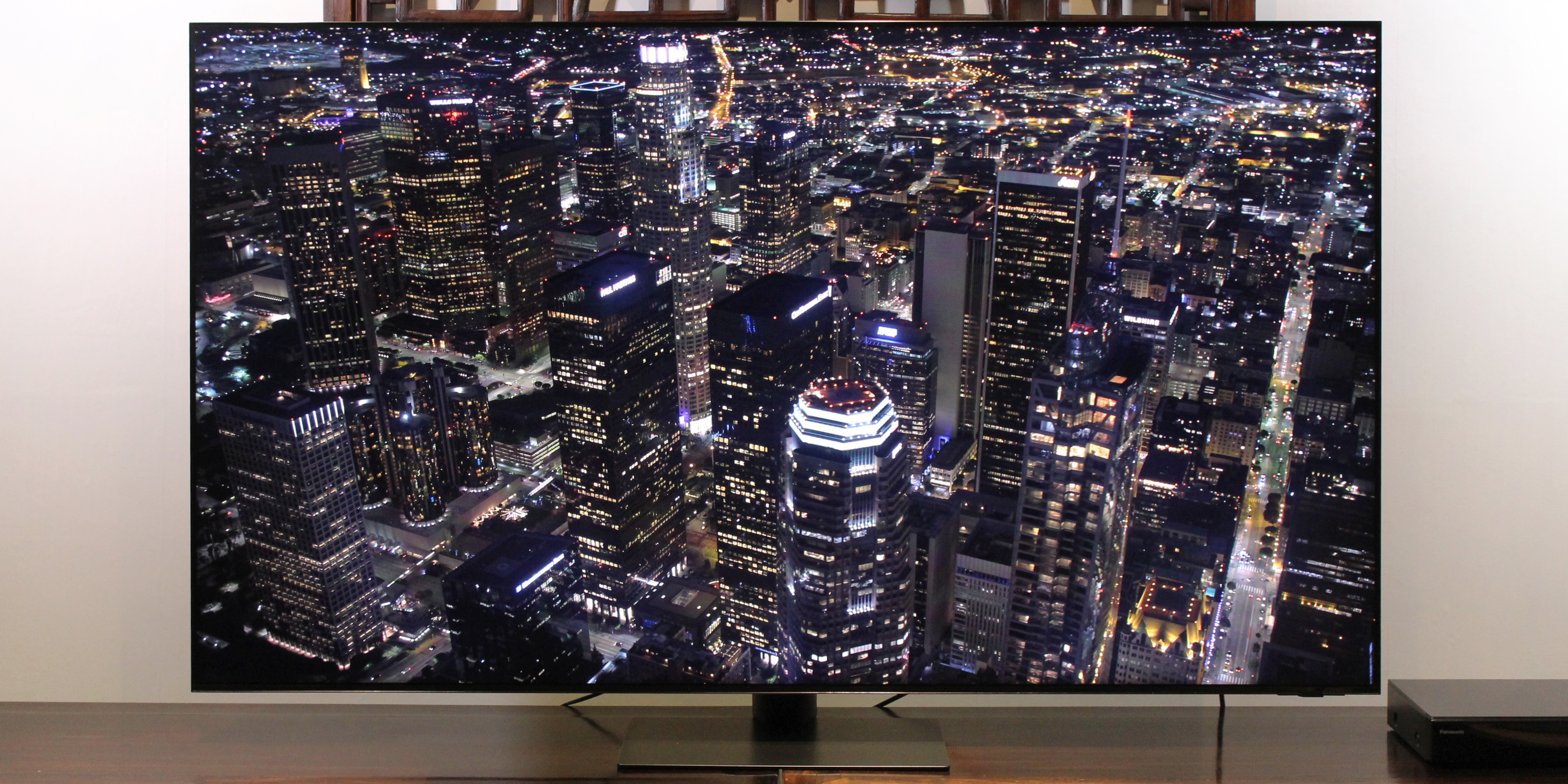
The Samsung QN95D is an awesome performer that’s capable of delivering deep blacks and bright highlights free of any blooming, even with HDR content. The 1,344 independent zones certainly play their part, but it’s also thanks to Samsung’s local dimming algorithms.
This contrast prowess is enhanced by 14-bit contrast mapping that brings out all the fine details in shadows just above black, while still retaining a pleasing depth. The processing also handles mixed content admirably, ensuring bright and dark parts of an image are perfectly rendered.
On top this the Quantum Matrix tech further improves the performance, while the Real Depth Enhancer Pro feature certainly lives up to its billing by adding greater dimensionality to images that helps bring out more detail while simultaneously expanding the general HDR definition.
The overall screen uniformity is also excellent, with no clouding or banding, and the screen filter remains highly effective, absorbing light from the front, and rejecting any ambient light in the room. The result is an equally impressive performance whether during the day or at night.
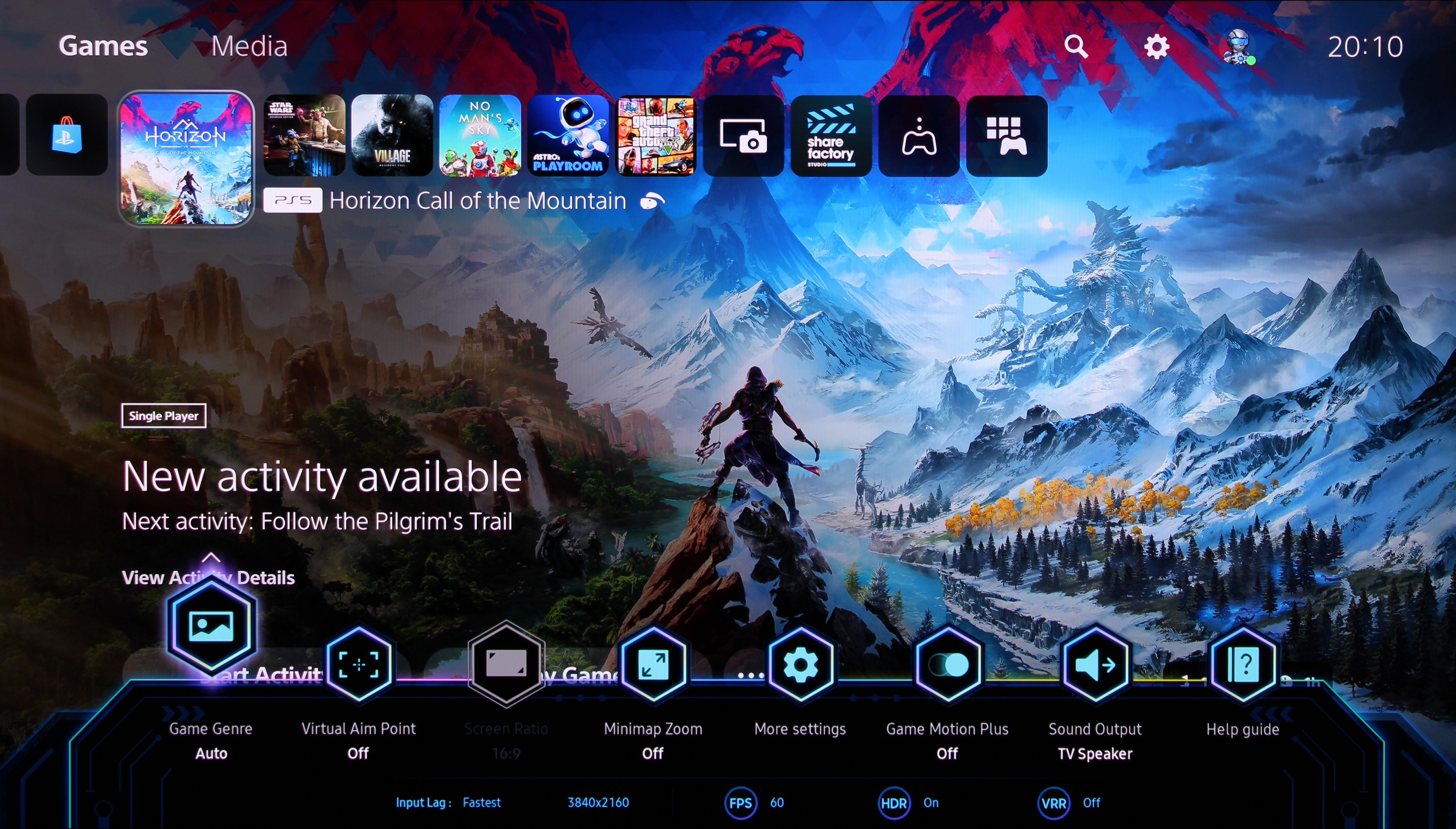
The Filmmaker Mode provides accurate pictures, retaining the content creator’s intent. In this more accurate picture mode we measured a peak brightness of over 2,250 nits (on a 10% window; 757 nits on a full-field pattern), and 95% coverage of the DCI-P3 colour space.
The tone mapping was absolutely spot-on in all our tests, taking advantage of the massive brightness and cutting-edge processing to produce impactful HDR images with specular highlights free of clipping, saturated colours, deep blacks and detailed shadows that aren’t crushed.
The motion handling is also excellent, which means films and TV dramas delivered at 24p benefit from movement that is reproduced without any unwanted judder or artefacts. There’s extra processing for fast-paced sports if necessary, and support for 144Hz higher frame-rate gaming.
All of this comes together beautifully when watching Anita: Battle Angel, with the exquisite details in the production design of Iron City brought vividly to life, while the natural but saturated colours and bright highlights pop. The black levels and shadow detail are equally impressive in this HDR presentation, while the frenetic motorball sequences benefit from the superior motion handling.
SAMSUNG QN95D REVIEW: SOUND QUALITY
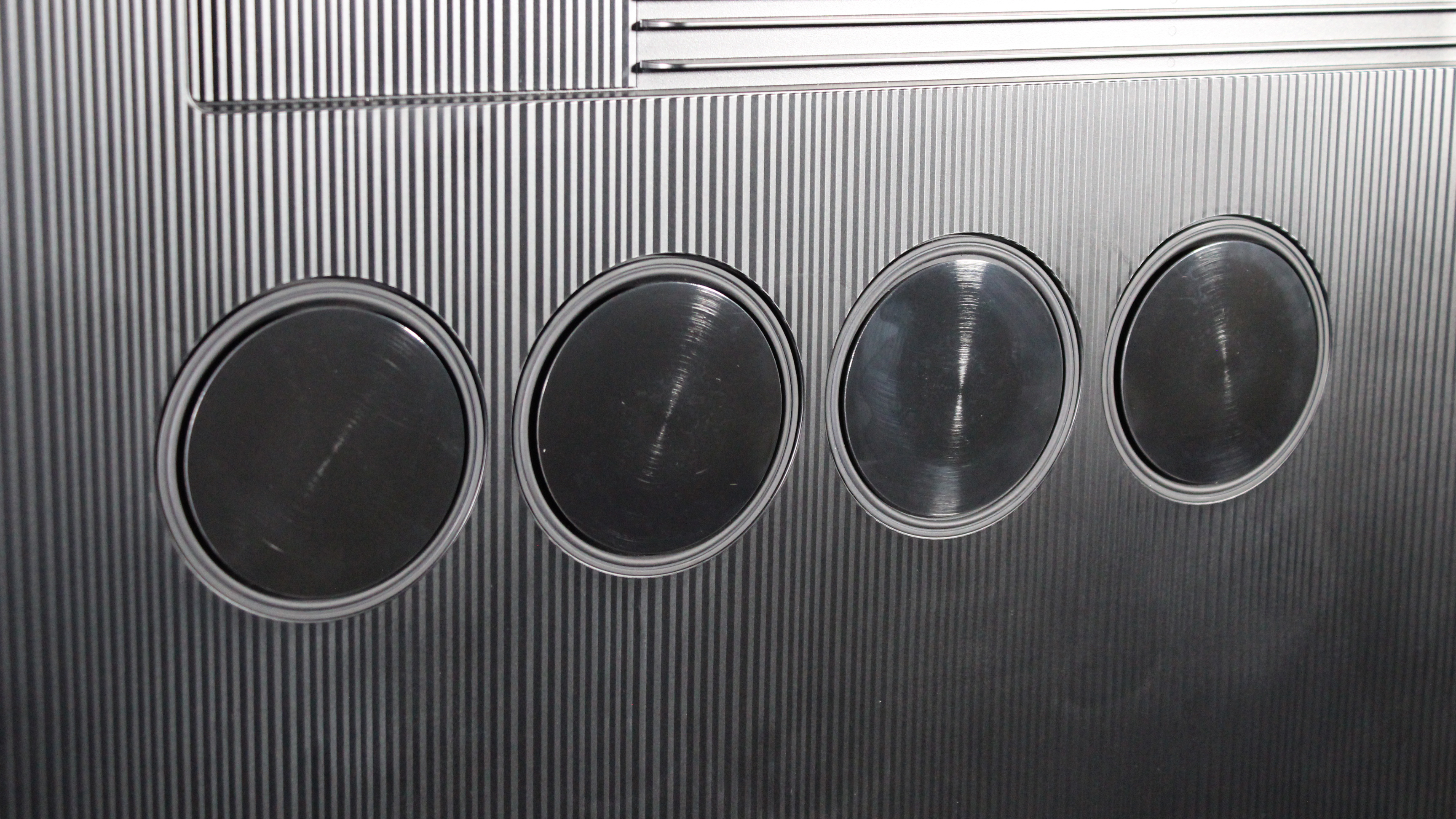
The Samsung QN95D is a great-sounding TV thanks to Dolby Atmos and a 4.2.2-channel speaker system that manages to cram six drivers and two woofers into its slim chassis. The result is a big soundstage that fills the space all around the TV, and delivers decent amounts of bass. You don't necessarily have to buy one of the best soundbars for Samsung TVs here.
Object Tracking Sound Plus certainly makes a noticeable difference, with height speakers that add another layer to the sonic presentation. Sounds clearly move around and above the TV to match the action on the screen, while dialogue always remains clear, focused and intelligible.
The inclusion of onboard Dolby Atmos decoding, along with the ability to send Atmos back via ARC, is also very effective. Object-based audio has more height, width and depth with Atmos content, and in general this sonically capable TV delivers impressive sound with any content.
SAMSUNG QN95D REVIEW: DESIGN & USABILITY
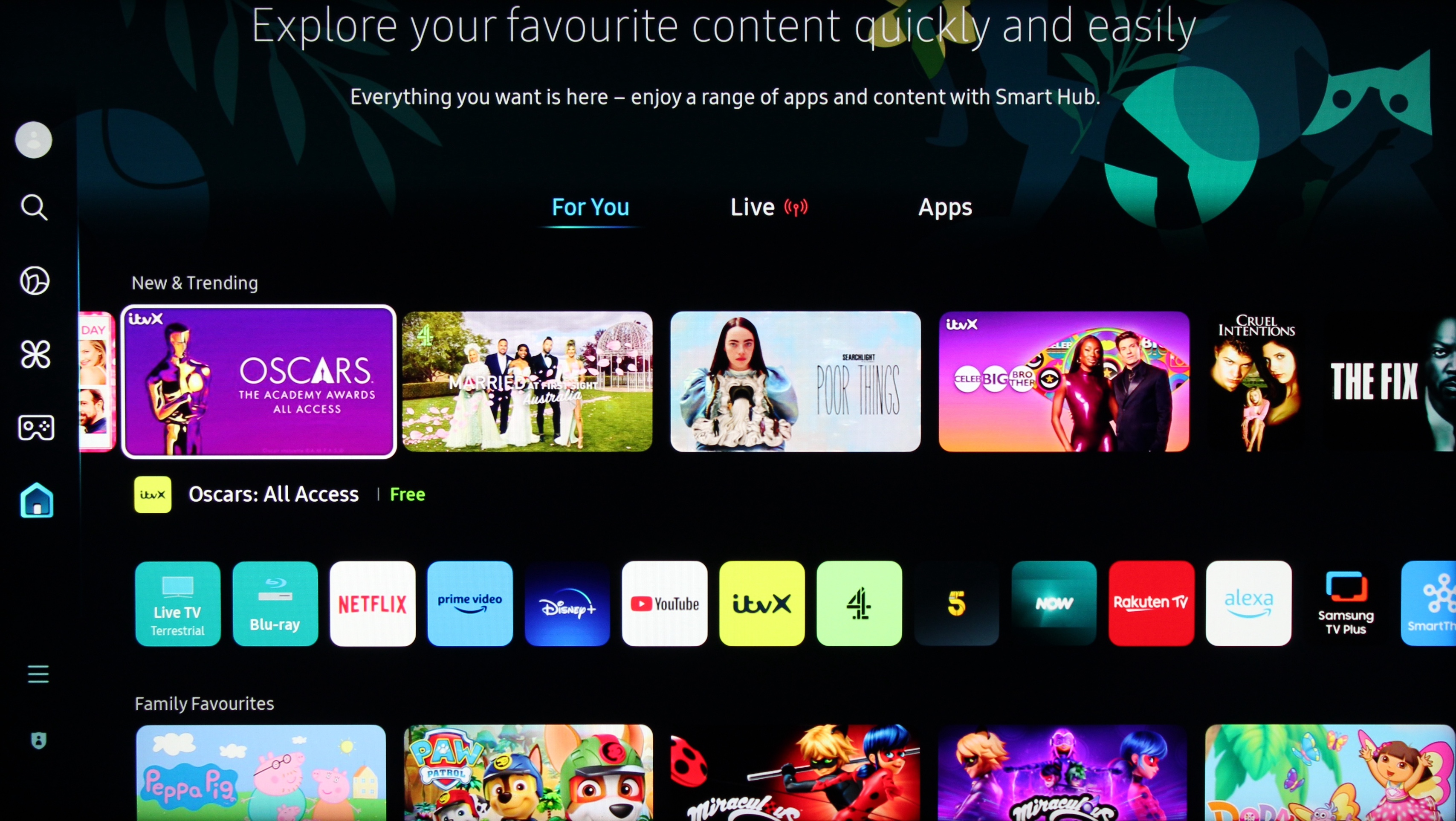
The Samsung QN95D retains the brand’s Infinity One design, with its contemporary finish and elegant styling. The Infinity Screen is bezel-less, and the build quality excellent, while the robust stand provides solid support and has a smaller footprint, which makes it ideal for narrower surfaces. The TV can also be wall-mounted using either a VESA or Samsung’s Slim Fit bracket.
In addition to the four HDMI 2.1 inputs, there are also two USB 2.0 ports, twin tuners for terrestrial and satellite broadcasts, a CI (common interface) slot, an optical digital output, and an Ethernet port. In terms of wireless connectivity, there's Wi-Fi, Bluetooth and support for Apple AirPlay 2.
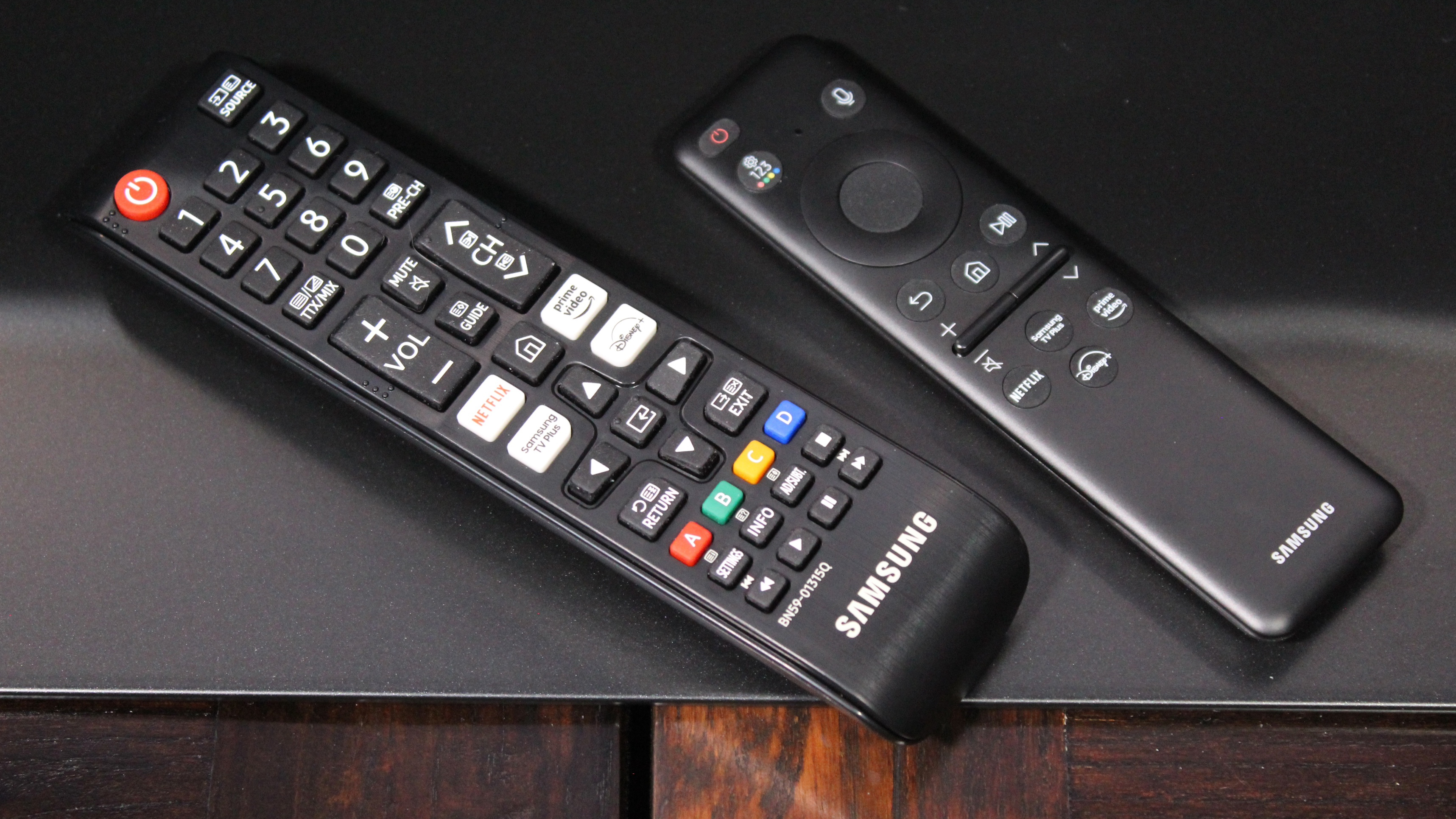
The QN95D ships with two remotes – a standard black zapper, and the Solar Cell controller. The latter offers a stripped-down choice of buttons that cover all the main functionality and control, plus there are direct access keys for Netflix, Prime Video, Disney+, and Samsung’s TV Plus.
In terms of other control options, there’s the SmartThings app, which makes setup easier, along with Bixby built-in, and the ability to work with both Amazon Alexa for a degree of voice control. You can even access Siri via Apple’s AirPlay 2 if that’s your preference.
The Samsung QN95D runs the latest iteration of the brand’s smart system, which remains a well-designed, intuitive to use, and highly responsive platform. The home user interface is similar to previous iterations but adds three sub-tabs towards the top called ‘For You’, ‘Live’, and ‘Apps’. These offer a more personalised experience, with focused recommendations and better-curated app choices.
Whatever your preference when it comes to video streamers, the QN95D offers a comprehensive choice with Netflix, Prime Video, Apple TV+, Disney+, Now, Rakuten, YouTube, and all the UK catch-up services. All these apps offer 4K, HDR10, HLG and Dolby Atmos where appropriate.
SAMSUNG QN95D REVIEW: VERDICT
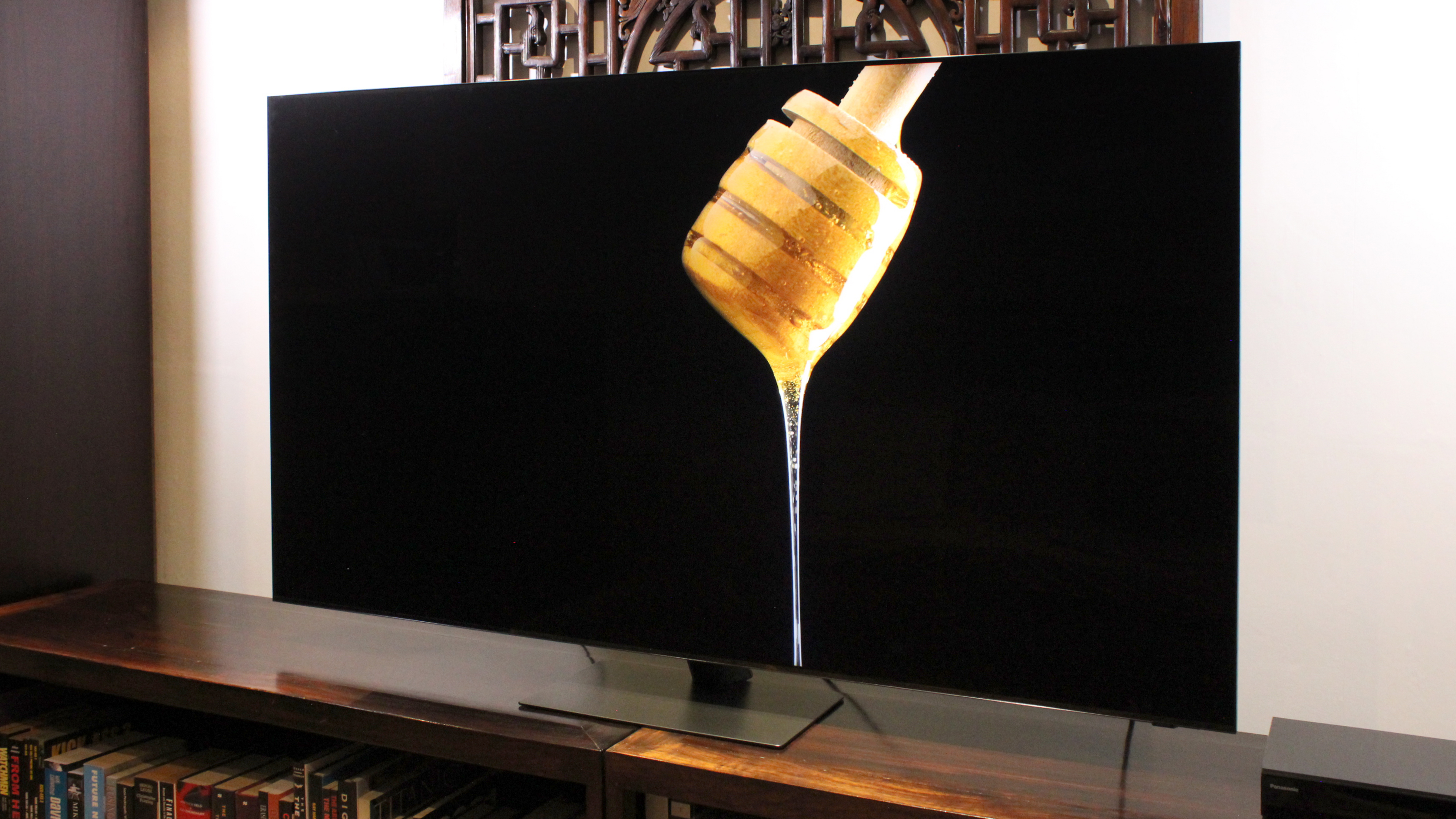
The Samsung QN95D retains all of the strengths of the previous model, then builds on them with groundbreaking AI-enhanced processing to deliver class-leading local dimming, deeper blacks, brighter highlights, and awesome contrast with plenty of shadow detail.
The upgraded image processing, combined with the purer Quantum Dot colours and QLED’s inherent brightness, results in stunning HDR with saturated colours and highlights that have real impact. It sounds great too, thanks to an immersive audio system and support for Dolby Atmos.
The design is stylish and the build quality excellent, while the smart platform remains comprehensive, and next-gen gaming features are extensive. Aside from the lack of Dolby Vision this Neo QLED 4K TV is hard to fault and proves to be a very capable high-end 4K all-rounder.
Also consider
Given the huge similarities between the Samsung QN95D and QN95C, you may wish to elect for last year's model if you can find it discounted. Or, if you want one of the best OLED TVs, which is ideal for pitch-perfect blacks, then the Samsung S95D is the logical alternative for 2024.
Sign up to the T3 newsletter for smarter living straight to your inbox
Get all the latest news, reviews, deals and buying guides on gorgeous tech, home and active products from the T3 experts
Steve Withers is a professional calibrator and freelance journalist who regularly contributes to T3, reviewing audio and video products, and writing articles. Steve has been writing about audio and video products for over ten years and, along with T3, he also contributes to TechRadar, Trusted Reviews, Expert Reviews, AVForums, Pocket-lint, Home Cinema Choice, and Wired. Steve is Level 2 certified with THX, the Imaging Science Foundation (ISF) and the Home Acoustics Alliance (HAA). As such, he remains abreast of all AV technology developments and the latest industry standards as we transition into a new era in home video and audio.
-
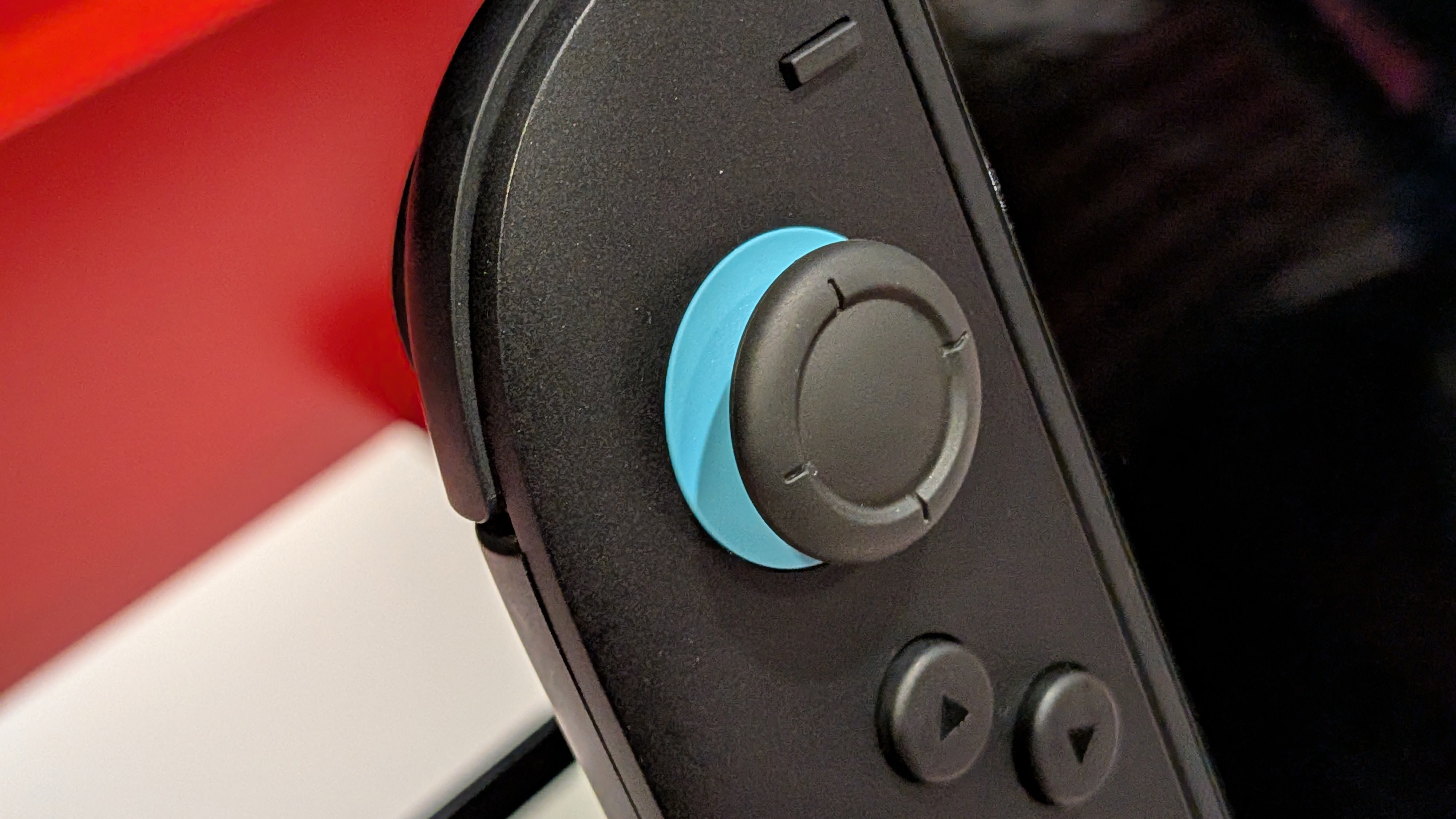 Nintendo Switch 2 tariff woes continue – here's how much it could cost you
Nintendo Switch 2 tariff woes continue – here's how much it could cost youExperts claim the Switch 2 will continue to be affected by Trump's tariffs – even as much as 145%
By Rik Henderson Published
-
 This one-day Apple Watch challenge could earn you a secret (non-virtual) reward
This one-day Apple Watch challenge could earn you a secret (non-virtual) rewardApple is now handing out animated trophies and real-life pins if you do a bit of exercise
By Matt Kollat Published
-
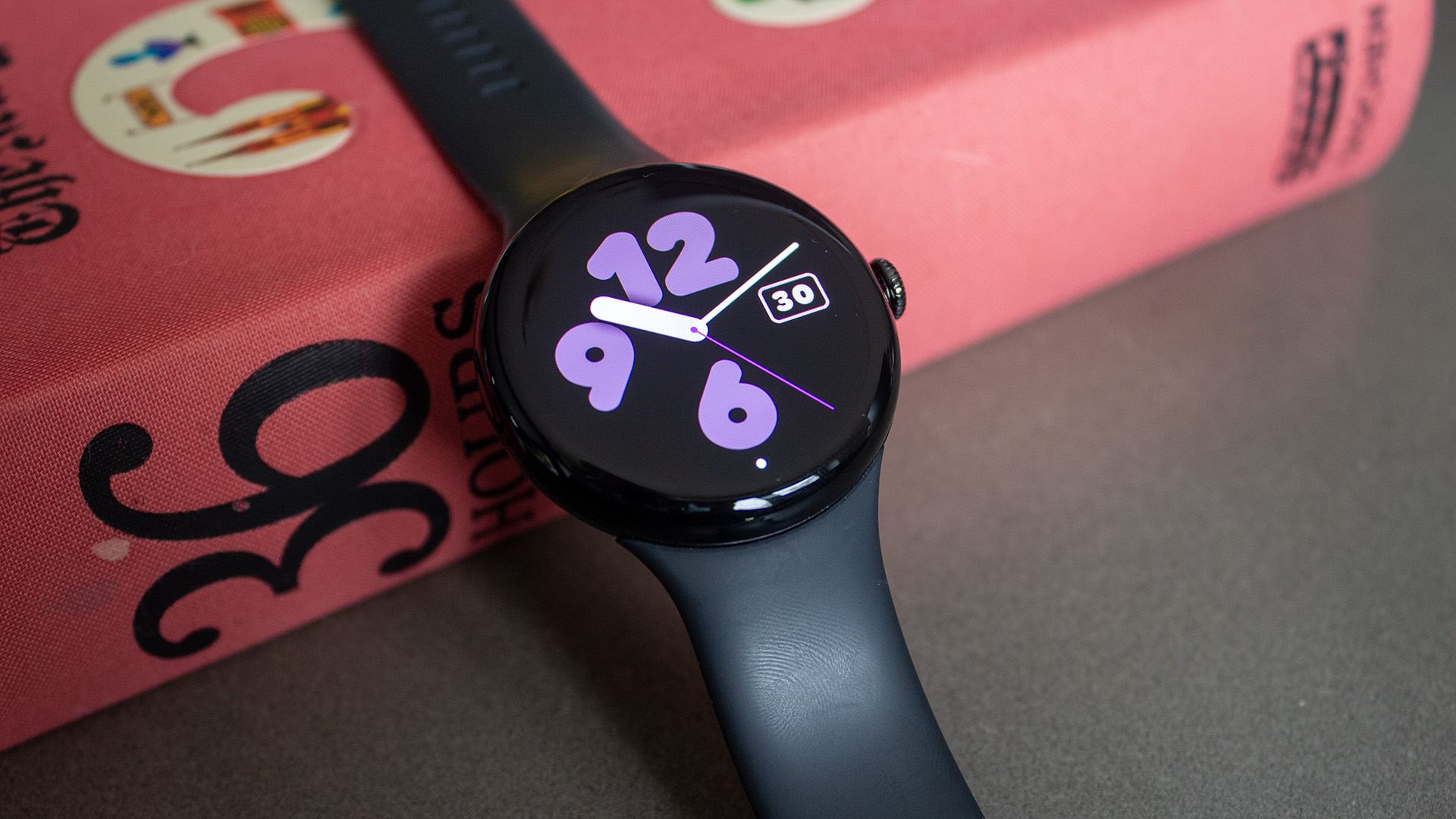 Google Pixel Watch 4 renders show a welcome design change
Google Pixel Watch 4 renders show a welcome design changeAnd one we're less thrilled about
By Britta O'Boyle Published